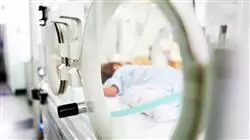University certificate
Scientific endorser

The world's largest faculty of nursing”
Introduction to the Program
Recognize the psychological, social and physical needs of your patients with hematological pathologies by complying with a program endorsed by experts"

Scientific advances in recent years have improved the chances of children with hematological pathologies receiving more appropriate treatments. These advances are continuous and require nursing professionals working in neonatology, emergency, hematology and pediatric ICU units to constantly specialize and update their knowledge, in order to offer quality and personalized care to children and families who require specific, advanced and complex care.
Nursing care of pediatric patients with hematologic pathology is a challenge for the patients and their family. This is because of the significance of the disease itself, its evolution, the intensive and specific treatment it requires, its side effects and the emotional and social repercussions it entails for them. The nursing professionals who care for these patients and their families are aware of the need to continue their academic studies in order to obtain a specific level of competence that will allow them to broaden their clinical care in response to the needs of their patients and their families.
The Professional master’s degree in Pediatric Hematology Nursing is unique in many aspects, since it addresses specific issues related to the treatment and care of children and adolescents with hematologic diseases, as well as providing support to the families that go through these diseases together with the children. In this way, students will achieve the knowledge and skills that will allow them to develop the personal and professional attitudes to face this type of situations in their work environments.
The teaching team is of recognized prestige and has extensive experience in internationally renowned units in the treatment and care of newborns, children and adolescents with hematologic malignancies. This Professional Master's Degree will provide scientific-technical knowledge and comprehensive care, so that students acquire the skills they require in order to care for children with hematologic pathology and their families, taking into account the physical, psychological, emotional, social and spiritual dimensions.
A 100% online Professional master’s degree that provides the student with the ease of being able to study it comfortably, wherever and whenever they want. All they need is a device with internet access to take their career one step further. A modality in keeping with the current times with all the guarantees to position the nurse in a highly demanded sector.
Stand out in your work environment by developing professional and personal skills to care for children with hematologic pathologies"
This Professional master’s degree in Pediatric Hematology Nursing contains the most complete and up-to-date scientific program on the market. The most important features include:
- The development of case studies presented by experts in Pediatric Hematology
- The graphic, schematic, and practical contents with which they are created, provide scientific and practical information on the disciplines that are essential for professional practice
- Practical exercises where the self assessment process can be carried out to improve learning
- Special emphasis on innovative methodologies
- Theoretical lessons, questions to the expert, debate forums on controversial topics, and individual reflection assignments
- Content that is accessible from any fixed or portable device with an Internet connection
Learn about the different bleeding disorders in newborns by following the practical examples presented by experts in Pediatric Hematology"
The program’s teaching staff includes professionals from the sector who contribute their work experience to this program, as well as renowned specialists from leading societies and prestigious universities.
The multimedia content, developed with the latest educational technology, will provide the professional with situated and contextual learning, i.e., a simulated environment that will provide an immersive program designed to learn in real situations.
The design of this Program focuses on Problem-Based Learning, by means of which the professional will have to try to solve the different professional practice situations, which will be presented throughout the program. For this purpose, the student will be assisted by an innovative interactive video system created by renowned and experienced experts.
You can access the program whenever and wherever you want thanks to its 100% online mode, which will allow you to continue with your daily work while you study"

With the help of experts in the field of Pediatric Hematology, carry out an in-depth review of the composition of the blood and the pathologies that can develop in children"
Why study at TECH?
TECH is the world’s largest online university. With an impressive catalog of more than 14,000 university programs available in 11 languages, it is positioned as a leader in employability, with a 99% job placement rate. In addition, it relies on an enormous faculty of more than 6,000 professors of the highest international renown.

Study at the world's largest online university and guarantee your professional success. The future starts at TECH”
The world’s best online university according to FORBES
The prestigious Forbes magazine, specialized in business and finance, has highlighted TECH as “the world's best online university” This is what they have recently stated in an article in their digital edition in which they echo the success story of this institution, “thanks to the academic offer it provides, the selection of its teaching staff, and an innovative learning method aimed at educating the professionals of the future”
A revolutionary study method, a cutting-edge faculty and a practical focus: the key to TECH's success.
The most complete study plans on the university scene
TECH offers the most complete study plans on the university scene, with syllabuses that cover fundamental concepts and, at the same time, the main scientific advances in their specific scientific areas. In addition, these programs are continuously being updated to guarantee students the academic vanguard and the most in-demand professional skills. In this way, the university's qualifications provide its graduates with a significant advantage to propel their careers to success.
TECH offers the most comprehensive and intensive study plans on the current university scene.
A world-class teaching staff
TECH's teaching staff is made up of more than 6,000 professors with the highest international recognition. Professors, researchers and top executives of multinational companies, including Isaiah Covington, performance coach of the Boston Celtics; Magda Romanska, principal investigator at Harvard MetaLAB; Ignacio Wistumba, chairman of the department of translational molecular pathology at MD Anderson Cancer Center; and D.W. Pine, creative director of TIME magazine, among others.
Internationally renowned experts, specialized in different branches of Health, Technology, Communication and Business, form part of the TECH faculty.
A unique learning method
TECH is the first university to use Relearning in all its programs. It is the best online learning methodology, accredited with international teaching quality certifications, provided by prestigious educational agencies. In addition, this disruptive educational model is complemented with the “Case Method”, thereby setting up a unique online teaching strategy. Innovative teaching resources are also implemented, including detailed videos, infographics and interactive summaries.
TECH combines Relearning and the Case Method in all its university programs to guarantee excellent theoretical and practical learning, studying whenever and wherever you want.
The world's largest online university
TECH is the world’s largest online university. We are the largest educational institution, with the best and widest online educational catalog, one hundred percent online and covering the vast majority of areas of knowledge. We offer a large selection of our own degrees and accredited online undergraduate and postgraduate degrees. In total, more than 14,000 university degrees, in eleven different languages, make us the largest educational largest in the world.
TECH has the world's most extensive catalog of academic and official programs, available in more than 11 languages.
Google Premier Partner
The American technology giant has awarded TECH the Google Google Premier Partner badge. This award, which is only available to 3% of the world's companies, highlights the efficient, flexible and tailored experience that this university provides to students. The recognition as a Google Premier Partner not only accredits the maximum rigor, performance and investment in TECH's digital infrastructures, but also places this university as one of the world's leading technology companies.
Google has positioned TECH in the top 3% of the world's most important technology companies by awarding it its Google Premier Partner badge.
The official online university of the NBA
TECH is the official online university of the NBA. Thanks to our agreement with the biggest league in basketball, we offer our students exclusive university programs, as well as a wide variety of educational resources focused on the business of the league and other areas of the sports industry. Each program is made up of a uniquely designed syllabus and features exceptional guest hosts: professionals with a distinguished sports background who will offer their expertise on the most relevant topics.
TECH has been selected by the NBA, the world's top basketball league, as its official online university.
The top-rated university by its students
Students have positioned TECH as the world's top-rated university on the main review websites, with a highest rating of 4.9 out of 5, obtained from more than 1,000 reviews. These results consolidate TECH as the benchmark university institution at an international level, reflecting the excellence and positive impact of its educational model.” reflecting the excellence and positive impact of its educational model.”
TECH is the world’s top-rated university by its students.
Leaders in employability
TECH has managed to become the leading university in employability. 99% of its students obtain jobs in the academic field they have studied, within one year of completing any of the university's programs. A similar number achieve immediate career enhancement. All this thanks to a study methodology that bases its effectiveness on the acquisition of practical skills, which are absolutely necessary for professional development.
99% of TECH graduates find a job within a year of completing their studies.
Professional Master's Degree in Nursing in the Pediatric Hematology Department
The work of pediatric nurses is vital for the correct growth and development of infants, children and adolescents. Thanks to their personalized attention at this stage of life, the psychological, social and physical needs of patients with blood pathologies can be recognized. To deepen this topic and provide the necessary basis for the training of professionals, at TECH we designed a Professional Master's Degree in Nursing in the Pediatric Hematology Service. A high quality program that will allow you to obtain a comprehensive view of the care and aspects needed to treat these diseases. During 1,500 hours of learning you will specialize in providing treatments adapted to each type of patient. From this, you will be able to work in neonatology, emergency, hematology and pediatric ICU units.
Professional Master's Degree on Blood Pathologies in Children
At TECH we have the largest Nursing Faculty; we offer you a highly trained program with which you will be able to acquire the necessary skills to diagnose and treat patients with related diseases. You will understand the evolution of intensive treatments, their side effects and the affective or social repercussions for each one; which will allow you to expand clinical care and provide immediate response to the patient's health needs. In addition, you will learn the basics of neonatal and pediatric hematology to treat diseases such as fetal hematopoiesis, anemia, coagulation disorders and hemophilias A and B. You will also delve into the use of central and peripheral venous catheters, pharmacological treatments and models of care centered on the NIDCAP approach.
Earn a postgraduate degree at the world's largest digital university
Nurses who wish to reinforce their knowledge and incorporate new skills to their career will find in TECH the necessary foundations to become experts in this area; they will be able to complement their curriculum with multimedia graphic content, scientific-technical lessons, participatory forums and the development of practical cases presented by high-level professionals. By taking this fully online Postgraduate Certificate you will specialize in treating malignant diseases ranging from B-cell acute lymphoblastic leukemia (B-ALL) to hemoglobinopathies, sickle cell disease and thalassemias.







